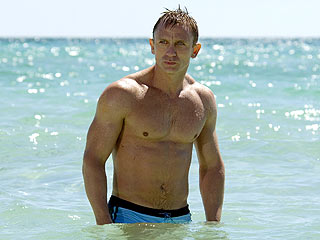Daniel Craig Body Measurements
The de Broglie–Bohm theory expresses in an explicit manner the fundamental non-locality of quantum physics. The velocity of any one particle depends on the value of the wavefunction, which depends on the whole configuration of the universe.
This theory is deterministic. Most (but not all) relativistic variants require a preferred frame. Variants which include spin and curved spaces are known. It can be modified to include quantum field theory. Bell's theorem was inspired by Bell's discovery of the work of David Bohm and his subsequent wondering if the obvious non-locality of the theory could be eliminated.
This theory results in a measurement formalism, analogous to thermodynamics for classical mechanics, which yields the standard quantum formalism generally associated with the Copenhagen interpretation. The measurement problem is resolved by this theory since the outcome of an experiment is registered by the configuration of the particles of the experimental apparatus after the experiment is completed. The familiar wavefunction collapse of standard quantum mechanics emerges from an analysis of subsystems and the quantum equilibrium hypothesis.
The theory has a number of equivalent mathematical formulations and has been presented by a number of different names. The de Broglie wave has a macroscopical analogy termed Faraday wave.
We have a configuration q of the universe, described by coordinates qk, which is an element of the configuration space Q. The configuration space is different for different versions of pilot wave theory. For example, this may be the space of positions of N particles, or, in case of field theory, the space of field configurations ϕ(x). The configuration evolves according to the guiding equation
Here, ψ(q,t) is the standard complex-valued wavefunction known from quantum theory, which evolves according to Schrödinger's equation
This already completes the specification of the theory for any quantum theory with Hamilton operator of type .
If the configuration is distributed according to | ψ(q,t) | 2 at some moment of time t, this holds for all times. Such a state is named quantum equilibrium. In quantum equilibrium, this theory will agree with the results of standard quantum mechanics. The double-slit experiment is an illustration of wave-particle duality. In it, a beam of particles (such as photons) travels through a barrier with two slits removed. If one puts a detector screen on the other side, the pattern of detected particles shows interference fringes characteristic of waves; however, the detector screen responds to particles. The system exhibits behaviour of both waves (interference patterns) and particles (dots on the screen). If we modify this experiment so that one slit is closed, no interference pattern is observed. Thus, the state of both slits affects the final results. We can also arrange to have a minimally invasive detector at one of the slits to detect which slit the particle went through. When we do that, the interference pattern disappears.
This theory is deterministic. Most (but not all) relativistic variants require a preferred frame. Variants which include spin and curved spaces are known. It can be modified to include quantum field theory. Bell's theorem was inspired by Bell's discovery of the work of David Bohm and his subsequent wondering if the obvious non-locality of the theory could be eliminated.
This theory results in a measurement formalism, analogous to thermodynamics for classical mechanics, which yields the standard quantum formalism generally associated with the Copenhagen interpretation. The measurement problem is resolved by this theory since the outcome of an experiment is registered by the configuration of the particles of the experimental apparatus after the experiment is completed. The familiar wavefunction collapse of standard quantum mechanics emerges from an analysis of subsystems and the quantum equilibrium hypothesis.
The theory has a number of equivalent mathematical formulations and has been presented by a number of different names. The de Broglie wave has a macroscopical analogy termed Faraday wave.
 Get a Body Like Daniel Craig. |  Brad Pitt and Daniel Craig |  Lower your body by |  The 81st Oscar Daniel Craig |  Mr. Bond (Daniel Craig)? |
 Buff Body Secrets | Daniel |  Get a Body Like Daniel Craig. |  Daniel Craig as James Bond has |  The 81st Oscar Daniel Craig |  KellyOlexa.com - Body |
This already completes the specification of the theory for any quantum theory with Hamilton operator of type .
 Daniel Craig Shirtless |  match that measurement and |  Cool James Bond Decal Daniel |  Craig\x26#39;s eyes have got it, |  Daniel Craig Reveals His Buff |
 that help run the body. |  Daniel Craig My Top 10 Male |  Get Daniel Craig |  Daniel Craig Body Building |  Daniel Craig Body Building |

0 Comments:
Post a Comment
Subscribe to Post Comments [Atom]
<< Home